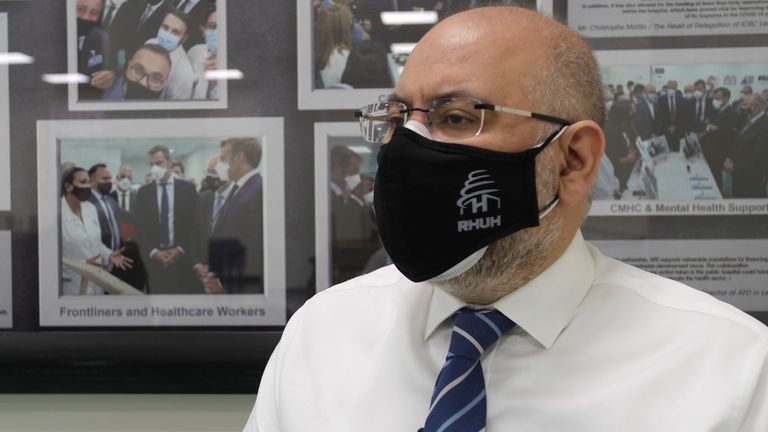The head of Lebanon’s main coronavirus hospital has said the country’s health system is close to collapse – with not enough beds, drugs, oxygen, ventilators or staff.
In a stark interview with Sky News, Dr Firas Abiad said the government decision to relax coronavirus restrictions over a few fateful days at Christmas and New Year has led to a huge increase in cases and deaths over the past few weeks.
He allowed our cameras into the casualty department and the intensive care unit of the Rafic Hariri University Hospital in Beirut to see the pressure he and his staff are under.
Dr Abiad said all hospitals were reporting full, or almost full, intensive care units – and many have patients stuck in emergency wards, waiting for a bed.
“Some patients are not able to find a bed and there’s been several cases where patients have died in their homes,” he said.
“If you look at the sharp rise in cases you see that Lebanon is really seeing unprecedented COVID numbers which is even beyond our wildest predictions.
“The number of daily new cases has almost quadrupled since where we were almost a month ago,” said Dr Abiad.
“At the same time we’ve seen that the number of deaths has also tripled and the number of patients in ICU has gone up by almost 100%.”
On 17 December, four days before a nationwide lockdown was due to end, the government decided to ease a series of restrictions for the holiday period.
Under intense pressure from businesses, they allowed nightclubs, bars and restaurants to open at 50% capacity while urging people to wear masks and maintain social distancing.
But videos on social media over Christmas and New Year showed packed clubs and bars. No attempts were made to crackdown on the violations.
“It’s clear that those were catastrophic [decisions] and what has happened is they’ve thrown the whole healthcare system of the country into a major abyss,” said Dr Abiad.
In the casualty department, the pressures are obvious. There is a shortage of beds, drugs, oxygen, ventilators and staff.
It is a relatively modern hospital but it looks sparse, except for the number of patients.
A nurse strokes a patient’s head.
“I am passing out… I am passing out,” he tells the nurse.
“No, no! You’re doing very well. Don’t be scared. Your oxygen is good. 99%. Honestly it’s very good,” she reassures him.
In the next bed is 53-year-old Aida Derawi. She first began to feel unwell 15 days ago. Her family had hoped she would recover at home, but this week things got worse.
“Yesterday I felt I couldn’t take it anymore,” she says. “My back and lungs were aching. My kids took me around to find a hospital but not a single one would accept me.”
Eventually space was found and she is improving slowly.
Nurse Hussein al Khazn tells us that in this wave of the virus, the patients are no longer predominately elderly.
“Much younger now,” he says. “Before we had 50, 60-year-old patients.
“Now it’s 20, 25, 30-year-old patients and they’re very, very critical – all of them.”
On the other side of the city, we’re given access to the Lebanese Red Cross coordination centre.
In a well-organised control room, a team of volunteers is juggling telephone calls from patients’ families with radio calls to the ambulance teams on the ground.
“So, she’s ill with coronavirus?” a volunteer asks down the line. “So she’s got shortness of breath?”
A radio message is sent to one of the dispatch teams.
“We’re dispatched to a patient that tested positive for COVID and she’s currently suffering from desaturation and vomiting,” volunteer medic Waad Abdulaal says from the passenger seat of the ambulance.
“So we’re going to go ahead, assess her and see if there’s a need to take her to the hospital.”
Lebanon was already in a critical state economically.
Years of accumulative economic mismanagement has led to a slow collapse in every sector of society.
That was then exacerbated by the pandemic and the devastating port explosion last year.
Up several flights of a stairwell, in darkness because of yet another power cut, the Red Cross team reaches its patient.
Madame Imad is 80 years old. She tested positive last week and her diabetes is complicating her condition. She needs to go to hospital, but there is an issue finding a bed for her.
The positivity rate across the country this past week has been at 21% (the 14-day rolling average).
That means the community spread of the virus is out of control. It needs to be at 5% before there is any chance of regaining a grip of the crisis.
Calls are made and they think space has been found at a hospital nearby.
Madame Imad is carried down the stairs as her daughter Sophie looks straight into our camera and pleads: “Show them that there are people dying before they reach the hospital.”
The elderly woman did make it to the hospital. But she was sent home again. There were no beds. Her family has told us her condition this weekend has worsened.



